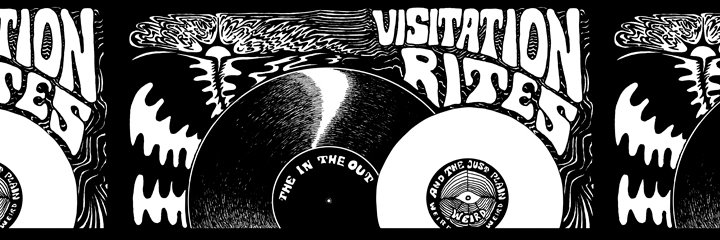
United States postal worker by day, musician and co-founder of the mythic Tetrapod Spools label by night, Mark Tucker is finally beginning to earn his due as one of America’s lesser-known outsider heroes. Batstew, his 1975 debut, is now a cult collectible, and De Stijl’s 2006 reissue of the album has expanded his fan base beyond the more obsessive collector contingent. With new reissue “In the Sack” (1982), Tucker’s second album, De Stijl reopens Tucker’s slanted and enchanted universe to the public.
Following Batstew, which doubled as an ode to girlfriend Eva Bataszew and a 1964 Cadillac hearse, Tucker struggled through a series of nervous breakdowns and relocated to Encinitas, California. The cover of In the Sack, released on Tetrapod Spools under the pseudonym T. Hunter Storm, signals the end of Tucker’s automobile obsession with an image of a postal truck crashing into a sand dune. And the beginning of a new one: among its many idiosyncrasies, Tucker’s second offering is arguably the only album ever made that can boast the U.S. Postal Service as a central narrative theme. If the open canvas sack in the foreground is any indication, In the Sack is as much about Tucker’s daily frustrations as a mail carrier as it is about his luck with the ladies—especially if we allow “frustration” to include frustrations of the sexual kind.
But asides from track four, which reproduces the boring bureaucratic details of a post office staff meeting, and track ten, a nine-minute rant against a male customer much richer and much more attractive than Tucker himself, In the Sack lacks the narrative focus of an actual concept album. More than tell a story, it recreates a headspace: one of a postal worker gone slightly “postal”, but who would rather search for creative ways to liven up his itinerary than go ahead and crash up the car. Resolutely Major key piano melodies set the soundtrack for a typical day out on the mail route, starting out all “walking with my mailbag and waving hi to all the neighbors” groovy, stumbling over a few tricky roadblocks (a lost letter, a rabid dog, a sexy lady), and ending, infallibly, on a note of reconciliatory schmaltz. Vibrato-laden vocals, recalling Van Dyke Parks at his most vaudevillian, combine with high-pitched wining, backwards song, spoken word, and passages of found sound, marking the manifold voices (and escape routes) of a man who spends his days walking and driving in circles.
Tucker clearly has a lot more formal musical training than most of the other outsider/real people artists who have made a comeback in the last decade (Kenneth Higney, Gary Wilson), and he probably could have dropped the mail gig and successfully pursued a career writing jingles for radio stations and children’s television shows. But writing TV music in the context of a rock album is a lot different from writing TV music for TV, and Tucker would probably have bristled at the very thought. Where else, other than in the privacy of his own home, could he have embellished his jazzy lounge numbers with the sound of sandpaper on wood, with one-man barbershop quartets, backwards love poems, Alan Vega shrieks, and recorded sound from a dinner at home with mom and dad? Where else could he have been free to create an album at once abysmally unfocused (to our ears, at least) and 100% his own?
The recent vogue for outsider music, and outsider art in general, is not without its ethical conundrums. One might argue that to laugh at the fruit of a troubled mind, even if we simultaneously experience it as beautiful, is to reduce “real people” and their art to a sideshow attraction. And to allow them to be exploited—or to exploit themselves—as such. But Tucker was aware of this way before Daniel Johnston ever became a household name, and he can be credited with a degree of self-awareness that most of his like-minded contemporaries would never own up to. “You’re selling your craziness,” Tucker’s mother famously complained upon the release of his first album. “So was Beethoven,” Tucker replied.
And who knows? Maybe one day misunderstood geniuses worldwide will be saying the same thing to their moms about Tucker.
Words: Emilie Friedlander
Originally published on Foxy Digitalis, Winter 2009

Like what we're doing here? Just a little pocket change gives Visitation Rites food to live on.




